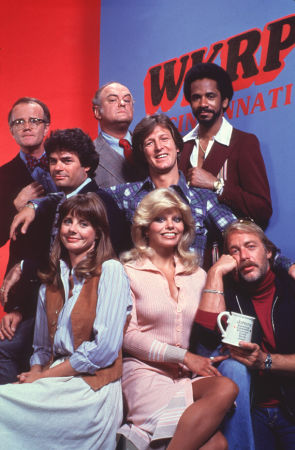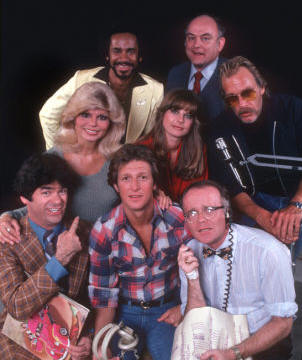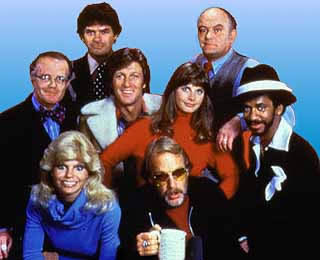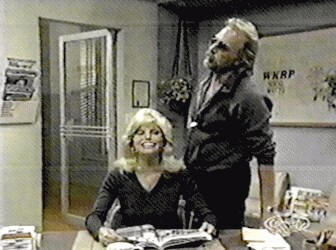Copyright ©2007 PopEntertainment.com. All rights reserved.
Posted:
April 24, 2007.
“Baby, if you ever wondered whatever
became of me… I’m living on the air in
Cincinnati. Cincinnati - WKRP.”
So
starts the theme to one of the classic sitcoms of the late
Carter administration, WKRP in Cincinnati, which is finally
being released on DVD.
The
series was made up with a colorful cast of characters. Howard Hesseman
played Dr. Johnny Fever, the hard-living DJ. Loni Anderson was Jennifer
Marlowe, the glamorous secretary who essentially kept the place running.
Tim Reid was Venus Fly-Trap, the super-fly DJ.
Gary Sandy was Andy Travis, the program director with great hair. Jan Smithers was Bailey Quarters, the shy, smart and beautiful assistant.
Gordon Jump played Arthur “The Big Guy” Carlson, the hen-pecked son of the
owner. Richard Sanders was Les Nessman, the self-important and insecure
news director. Frank Bonner was Herb Tarlek, the sleazy sales manager.
All
of these characters have taken a place in sitcom lore since the series
debuted on CBS in 1978. The show lasted for four seasons, but it was a
phenomenon upon its debut. Thanks to the TV on DVD explosion, the classic
first season is now making it to the stores nearly three decades later.
“It’s hard to believe that it’s been 30 years,” admits Howard Hesseman.
“And terrific that it’s being released on DVD, because I think more people
will see it, or people will be reminded of it that are already familiar with
it but haven’t had access to it through syndication in the last few years.
I’m like everybody else that worked the show. I was really proud of it. We
had a great time doing it. I think it shows, in some fashion, that the good
time we had doing it is in evidence on some level when you look at it.”
Loni
Anderson agrees, “It just seems like yesterday. But who knew that this
would ever be possible? It’s just incredible [that the show is being
released on DVD]. I’m so glad. I have grandchildren who’ve never seen it.
I’m very excited that they’ll get to see what all the fuss was about.”
 The
funny thing is, these two almost did not play the characters which made them
household names. Hesseman was called to audition for the show while he was
playing a recurring character in a story arc for the sitcom Soap.
When he got there he was given a script to look over. The problem was,
creator Hugh Wilson saw Hesseman as the polyester-clad sales manager Herb
Tarlek.
The
funny thing is, these two almost did not play the characters which made them
household names. Hesseman was called to audition for the show while he was
playing a recurring character in a story arc for the sitcom Soap.
When he got there he was given a script to look over. The problem was,
creator Hugh Wilson saw Hesseman as the polyester-clad sales manager Herb
Tarlek.
He
told the producers, “I have to tell you, I’m far more interested in this
disk jockey. I know some people in radio in San Francisco. I have an idea
who this guy is and what his life might be like that I’d be happy to share
with you. But I’m really not interested in doing the salesman character.”
Hesseman laughs at the memory. “I remember leaving the room, one of
them said, ‘You’re certain about the salesman?’ I said, yeah, if it’s the
disk jockey or the salesman, it’s got to be the disk jockey. Because, it’s
the disk jockey or nothing as far as I’m concerned – sort of a show of
bravado that paid off. But it turned out that the next person through the
door to meet them was Frank Bonner, whom they ended up casting as Herb
Tarlek. Frank and I, it turns out, were born one day apart. And our
dressing rooms were next to one another. So, I have great memories of times
spent with Frank on the show. But, my memories of that show – even though my memories are getting old and kind of lazy – are very
good. It was a great group of people.”
In
the meantime, Anderson had been avoiding going in to audition for a while because
she had no interest in playing a stereotypical character. Finally her agent
convinced her to go, if for no other reason so that they may consider her
for something in the future.
“I
went in on a Saturday,”
Anderson
recalls. “Hugh Wilson and Grant Tinker were nice enough to come in on a
Saturday. I basically went in with my little soapbox to give my little
speech about how I didn’t like the idea of ever being a dumb blonde or
window dressing or anything like that. I was a serious brunette actress,
thank you very much. I hope they’d consider me again sometime. So I did my
speech and then Hugh said, ‘Well, how would you do it?’ That’s how it all
started. And I got the job.”
It
is somewhat ironic that both of the actors held out to make sure that they
got the roles that they wanted – because after long careers in which each
has played many other characters, Dr. Johnny Fever and Jennifer Marlowe
still somewhat define
Hesseman
and Anderson in the public eye. While there
are some pragmatic reasons for that (“I think because it reran forever,”
Anderson
suggests), it also shows that the characters struck a real chord with the
audience.
“It
was very innovative for the time,” Anderson explains. “No glamorous women
had been funny. Pretty women had been funny, but not glamorous women. Most
glamorous blonde bombshell kind of women had been ditzy. I have a
lot of women fans. [It was] women who really were impacted the most by the
character – knowing that you could be glamorous in the workplace and still
be the smartest person in the room.”
 Hesseman
also thinks that his character resonated with the public, but for a slightly
different reason.
Hesseman
also thinks that his character resonated with the public, but for a slightly
different reason.
“I
think that all of us have a kind of iconic disk jockey in our back-brain –
if you grew up in
America,
certainly,” Hesseman says. “There had to be a moment in a parked car, late
at night, when your DJ played specific song that made something wonderful
happen. I always felt like people have that aural connection in
their head. It's always come to them aurally – through their ears. Here
was a chance to showcase where that experience came from. It was new
workspace to examine without getting deeply into how radio stations
operate. The show was really about how people operate in a specific place.
I have to credit a great deal of it to the writing. Because Hugh… No
matter how funny a joke was, he would kill it. He would scratch it if it
got in the way of telling the story. As he would repeat over and over,
we’ve only got 22 minutes to tell a story with a beginning, middle and an
end. We can’t be leaning out for jokes.”
Those stories worked mostly because of the characters and the cast. One of
the greatest things about the show was the ensemble. The world of WKRP
was sort of a generation gap mixture of the hip and the old school. Somehow
that combination just clicked.
“Hugh always said that, in creating the show, he wanted to create for any
viewer somebody they’d really like and somebody they wouldn’t like all that
much,” Hesseman says. “Since conflict is at the heart of drama and comedy
as well, he really started off with the right footing. Although they were
sort of generic characters, he was also smart enough, hip enough as a writer
to make them specific. He hired writers who hadn’t worked in sitcoms. Most
of them came out of the ad game, as did Hugh. So, they had a different
approach to finding humor. They weren’t just looking for jokes that
worked. Of equal importance, that from Hugh on down, virtually everybody in
the company was collaboratively minded. We all felt free to offer ideas to
one another. In a workplace, cooperation goes a lot further than
competition, I think.”
That
sense of collaboration was contagious, Anderson agrees. “It was immediate.
Everybody seemed to be in exactly the right part. Even though we were of
different generations and different schools, everybody was pulling for one
another. On the show, [there was] the feeling of the characters all caring
about one another and caring what happened to each other. Then behind the
scenes, too, we were all a family. So I think that just carried through.”
Of
course, the world has changed a lot in the time since WKRP ruled the
airwaves, but those changes somehow make the show even more enjoyable in the
sometimes overwhelming modern world. For example, looking back from a
television world where gritty realism and harsh language is
a way of life, it’s nice to ruminate back on a world where it was a real
accomplishment for a DJ to be able to say the word “booger” on the air.
 “Well,
you know, those were different times,” Hesseman laughs.
“Well,
you know, those were different times,” Hesseman laughs.
“Gosh, it has changed a lot, hasn’t it?” Anderson says.
“We used to get memos about so many different things that now people don’t
blink an eye on shows that are on today.”
For
example, in this post-sexual harassment world, could a show pull off a
relationship like that of Jennifer and Herb Tarlek, in which the married
sales manager was coming on to her on a nearly constant basis?
“I
think [it’s funny] only because she handled him,” Anderson says. “He never
really got anywhere. I think more women would like to know how to keep
everybody in their place. Because, I don’t think it stopped, I just think
you could be more threatened by it. There could be a lawsuit about it.
Jennifer just knew how to handle it.”
“All
I can remember was Herb saying something in the pilot, something like ‘I
could get you a side of beef.’” Hesseman laughs hard. “Frank Bonner was so
great in that part. He used to just destroy me. I was afraid I was going
to go up in scenes, because he had that guy down so thoroughly.”
Sadly, three decades on from the show, the idea of a sitcom is on
life-support. There are some good ones out there, but way too much the
artform is being replaced by reality television. Watching the old episodes
of WKRP is just another reminder of how much we
need and miss them.
“I’m
very sad to see that they’re going,” Anderson says. “Well,
scripted television altogether has certainly taken a dive since we’ve had
all this reality. I hope it comes back and I hope comedy comes back.”
 “I
think they’re such a hard sell because [sitcoms] cost more money than
reality shows,” Hesseman says. “People, for
whatever abhorrent reasons, are more and more maniacally inclined to try to
get on camera and reveal themselves for the fools that they are. I always
felt that if I’m going to do that, I should be paid, and I studied to find
ways to do it.” He laughs. “You know, I’m not really interested in
finding out if I could bungee-jump of a 47-story building with my mouth full
of worms. That kind of stuff, I just don’t understand it. Unless it’s just
that we’ve as a nation just developed this real appetite for humiliation.
In which case, we’ve certainly got the right administration.”
“I
think they’re such a hard sell because [sitcoms] cost more money than
reality shows,” Hesseman says. “People, for
whatever abhorrent reasons, are more and more maniacally inclined to try to
get on camera and reveal themselves for the fools that they are. I always
felt that if I’m going to do that, I should be paid, and I studied to find
ways to do it.” He laughs. “You know, I’m not really interested in
finding out if I could bungee-jump of a 47-story building with my mouth full
of worms. That kind of stuff, I just don’t understand it. Unless it’s just
that we’ve as a nation just developed this real appetite for humiliation.
In which case, we’ve certainly got the right administration.”
So
now, nearly thirty years on, WKRP still has a loyal following – a
core audience that has been jonesing for the release of the series on DVD.
Now that it is here, it makes the stars happy that they can share the
experience with the audience that has been there with them for so many
years.
“It’s just wonderful,”
Anderson
says. “I’ve known for years that there are staunch fans. You know when the
reruns come on and the fan mail keeps coming. New generations who weren’t
even born when you went off the air are rediscovering it. It’s thrilling.
It’s just terrific.”
“It’s very gratifying, you know?” Hesseman agrees. “You like to feel that
what you’ve done meant something to somebody. It still makes me feel good
when I’m walking down the street and somebody says, ‘Hey, doctor!’ I turn;
never mind that there might be an ambulance there and people in white coats
trying to save lives. I think it’s about me. But, I’m quite pleased when
somebody acknowledges that they dug something that I was a part of.”
Email
us Let us know what you
think.
Features
Return to the features page.

Copyright ©2007 PopEntertainment.com. All rights reserved.
Posted:
April 24, 2007.